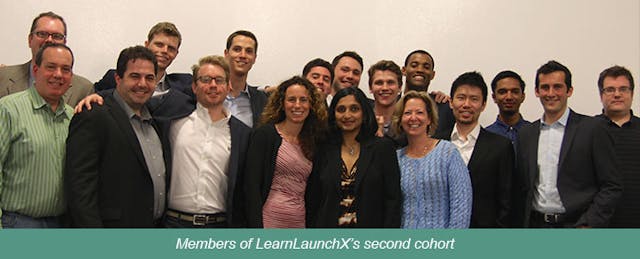A windy May 28th evening in Boston’s seaport district saw the LearnLaunchX spring 2014 class’ debut.
LearnLaunchX’s Demo Day saw a wide range of challenges in education posed, along with innovative solutions hoping to solve those challenges. From empowering educators and administrators via data-driven decision-making to improving student engagement by tapping into the power of social technologies, the entrepreneurs’ drive, hard work, and clear passion for education rang clear throughout the presentations.
This second round of LearnLaunchX cohort members received seed funding, a collaborative workspace, access to the learning marketplace, mentorship from leaders in the industry, and a thoughtful and structured growth and development program. (The first LearnLaunchX cohort graduated in September of 2013.)
The evening began with a video message from Boston’s mayor, Marty Walsh, who shared his enthusiasm and support for the edtech startup community in Boston. Each company was then introduced by either an educator user of the product or by an edtech mentor. Here is a snapshot of the seven start-ups from LearnLaunchX’s second cohort:
Higher Education Solutions
David Kozhuk of uConnect (@gouconnect) kicked off the evening with an intriguing paradox: career services are the most important piece of higher education, and yet, universities’ career services websites just aren’t engaging their students in meaningful ways. In response, uConnect seeks to “effectively engage students in career exploration and help them transition into rewarding careers.” Kozhuk explained that uConnect makes it easy for students to use their school’s career services resources, networks, and expertise, and simplifies the job search process. With recruiting videos, online case studies, and “challenges” in place of the standard three-paragraph cover letter, uConnect’s custom job search platform looks to switch up university recruiting and take some of the stress out of a college student’s senior year.
On the opposite end of the university experience was Dave Meyer, CEO of Campuscene (@campuscene). By gathering data on a student’s various touch-points with the admissions process, Campuscene solves the recruitment challenge of predicting incoming student enrollment. For prospective college students, Campuscene offers free virtual tours of college campuses all in one place. For universities, Campuscene consolidates the data on students’ engagement with a university’s admissions office, social media marketing efforts, and more.
To complete the higher education pitches, Nick Zeckets of QuadWrangle (@quadwrangleinc) presented his company’s solution to improving alumni engagement. In particular, the issue of low alumni giving plagues development offices across the country. As Zeckets noted, the current systems in place are fueled by generic requests for donation, whereas “your alma mater probably needs money for something you actually care about!” QuadWrangle hopes to solve that problem by using natural language processing and a number of social media APIs to connect alumni’s experiences and interests to current campus events and relevant donation opportunities personalized to each alum.
K-12 Solutions
As the first of the K-12 product entrepreneurs, CEO Joshua Beach explained how Book&Table (@bookandtable) is reimagining tutoring through its “marketplace that connects professional tutors with students through personalized, in-person courses.” Having been a tutor himself, Beach quickly discovered the constraints and challenges both of being an independent tutor and of working with a larger tutoring franchise. In both cases, parents and tutors do not have all the information they need on hand to make the most informed choices. Thus, Book&Table seeks to facilitate direct communication between expert tutors, parents, and students.
Shifting gears to in-class challenges, Skaffl (@skafflapp) tackles the paperless workflow mess that ensues as iPads increasingly fill K-12 classrooms. During her time as an educator and instructional technology specialist, co-founder Rita Chesterson and her fellow teachers would put together piecemeal hacks to manage their assignments across multiple apps for their all-digital iPad classes. Confronted with this challenge, Rita and her co-founders decided to build a solution to address this need. With Skaffl, students can complete and manage assignments directly in the built-in editor; teachers can provide feedback and complete grading all within the Skaffl app itself; and parents and administrators can stay connected to what’s going on in the classroom.
Hstry (@hstryorg) was born in the wake of the now-CEO’s (Thomas Ketchell) wildly successful reenactment of the 1952 Great Smog of London over Twitter. True to its name, Hstry uses social media to reenact historical moments and to bring history to life for students in fewer than 140 characters at a time. In addition, Hstry has developed a timeline creation tool, allowing anyone to create their own timelines using the free platform. As part of its future plans, Hstry is considering integration with Edmodo and MOOCs at certain universities.
Finally, Sheela Sethuraman of CueThink (@cuethink) took the stage to share how her company is going to #makemathsocial. CueThink is a peer-to-peer learning platform that develops students’ math problem solving skills. In guiding students’ through the problem solving process, CueThink provides teachers with valuable insights into their students’ thinking process. For students, the social driver behind the peer-to-peer learning framework helps--dare we say it--to make math fun.
For additional details, check out the Twitter hashtag #llxdemoday for tweets from the event.


